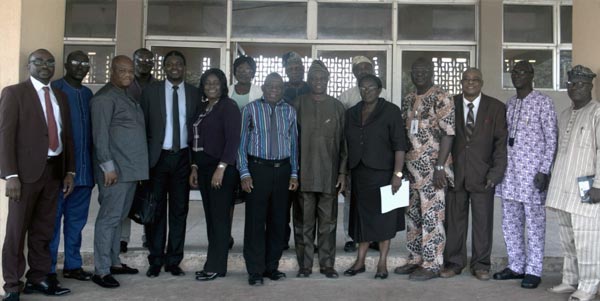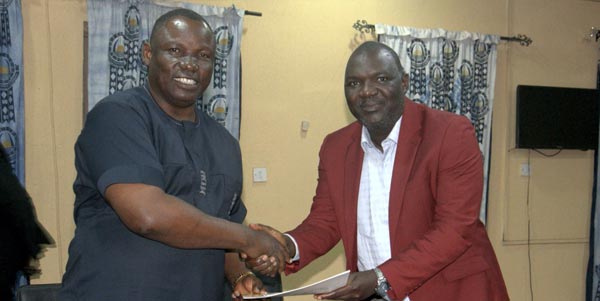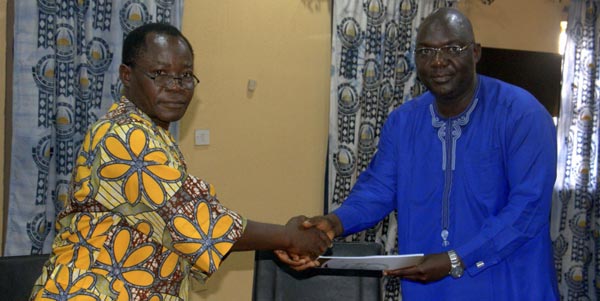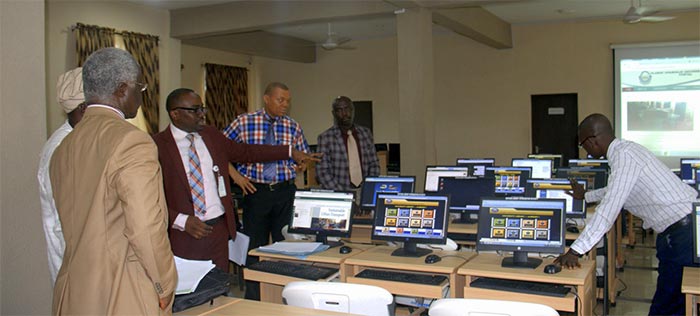Four programmes were recently visited at OOU by the National Universities Commission Accreditation Teams. The programmes were Transport Management, Fine and Applied Arts, Zoology and Physiology.

While receiving at different times, the Team Leaders and their members for each of the programmes in his office, the Vice-Chancellor, Professor Ganiyu Olatunji Olatunde warmly welcomed them to the University and briefed them about the historical background of the institution. According to the Vice-Chancellor, Olabisi Onabanjo University was established in 1982 with a multi-campus system spread across the state. He informed members of the accreditation teams that the University have three Colleges, 13 Faculties and runs 75 programmes with almost 99% of them being accredited.

The Vice-Chancellor also informed them that OOU, as an institution, strongly believed in the accreditation process. “We believed very strongly and honestly that accreditation processes are to correct and assist us in improving our programmes, so that we can produce quality students for National development”. Thereafter, Professor Olatunde reaffirmed the readiness of the University for the accreditation exercise. He expressed his confidence in the level of the University’s preparation and most importantly, in the ability of the teams to do a thorough job.

NUC Accreditation Team for Transport Management round the Library
Speaking at seperate times, leaders of each accreditation team expressed their pleasures to be in Olabisi Onabanjo University. They informed the Vice-Chancellor and his management team and indeed the senior Faculty members, whose programmes were scheduled for accreditation that the exercise was a peer group assignment. They expressed heir hopes that with the assurances given by the Vice-Chancellor, they had no doubt that necessary arrangements had been made to make the exercise a hitch free one.

As tradition demands, each accreditation team after visiting the Vice-Chancellor in his office, departed to the various departments, where the programmes slated for accreditation were domiciled.
After spending rigorous two to three days visiting the various departments, examining their books, documents, files and interacting with staff and students, which also included the inspection of physical facilities, libraries and other resource materials, the teams at different times returned to the office of the Vice-chancellor to give their Exit Reports.
A summary of the reports as presented by the team leaders for the four programmes that were visited, indicated that the University performed creditably well and members of the accreditation teams were satisfied with what they met on ground.

On curriculum, it was reported that all the four programmes visited have standard curricula that were adequate in preparing students for their chosen professional careers or disciplines.
Students admitted into the programmes being accredited were also found to have met the admission requirements as stated in the various departmental handbooks. According to Professor Cliford Nwanoa, the NUC accreditation team leader for Fine & Applied Arts, “the qualifications of all the students admitted into the programme were examined by the panel and found to meet the NUC Minimum Academic Standard required for admission, in relation to those laid down for the programme.”
Commenting on Course Evaluation, the various team leaders reported that questions set for degree and past examinations were of good standard and in line with the programmes. They added that the standard of students’ answer scripts were also appropriate. “There is evidence of external moderation system. Competent and eminently qualified Professors from recognized Universities were invited as External Examiners”, said Professor Dakul Dannan Anthony, who was in charge of the accreditation team for the Zoology programme.
On staffing, the teams have good news for the University as they reported that the academic staff employed were qualified and adequate in number. They also commented that the staff/students ratio as specified by the NUC BMAS was met. It was also noted that the majority of the Teaching Staff possessed Ph.D degrees with over 80% of them benefitting from the Staff Development Programme of the University. The leadership qualities of the various Heads of Departments, where the four programmes were domiciled, did not go unnoticed by the various accreditation teams. Their administrative competence, in fostering unity among their departmental staff, were highly rated.
Speaking about his team while giving his Exit Report on Physiology, Professor (Sir) A. C. Ugwu of the University of Benin, stated that “the Head of the Department is a qualified Professor working as a team with all staff. They were competent to impact on the students through teaching and research. There is cooperation and esprit de corps among the staff which shows evidence of good leadership”.
The various reports on the physical facilities of the programmes visited were quite heart warming and satisfactory. It was reported that there were adequate equipment and facilities in the laboratories visited. The equipment was not only available, but also functional. The teams also noted that spaces, furniture and safety equipment were adequate.
On the library, it was reported that the University Library and the various departmental libraries were equipped with good quality books, journals and other resource materials for learning. According to Professor Eno Okoko, the accreditation team leader for Transport Management, “the library holdings were observed to be very current for texts and journals. There is evidence of regular subscription for e-resources and they are always available to staff and students”. Professor Okoko stated further that the sitting arrangement in the library was very decent and spacious.
On funding, the accreditation teams acknowledged evidence of direct funding for the various programmes undergoing accreditation. They equally noted that the funding for the programmes were reasonably adequate. However, it was noted that there was room for improvement in the funding of the programmes, especially Zoology.
Responding to the Exit Reports of the four Accreditation Teams at separate times of their presentations, the Vice-Chancellor, Professor Ganiyu Olatunji Olatunde profusely thanked the members of the NUC accreditation teams for their visitation and for doing a thorough job. “We have listened attentively to your comments and some of the issues raised. I want to assure you that where to improve upon, we shall earnestly do so. Our tomorrow will certainly be better than today”.
He explained to them that the University was trying to create an aesthetic environment that will be green, serene and friendly. “A kind of environment that will affect the psyche and improve the behaviour of our students” said Professor Olatunde. He stated students” said Professor Olatunde. He stated further that the University was trying to inculcate into its students, (though very few in number) the need to dress properly by not wearing torn jeans to the campus or loose dress that will expose part of their body.
Professor Olatunde also assured the NUC Accreditation Teams that the University would improve the funding situation of its programmes. He informed them that the University was really spending a lot of money on its programmes, as “we are averse to window dressing”. According to him, efforts were been made to employ more academic staff in some critical areas. Professor Olatunde further informed the team that the University has now pegged its admission quota per programme to 100 students.
In rounding off, the helmsman wished the various teams journey mercies to their Universities and thanked them again for a job thoroughly done during their for visit to Olabisi Onabanjo University.

